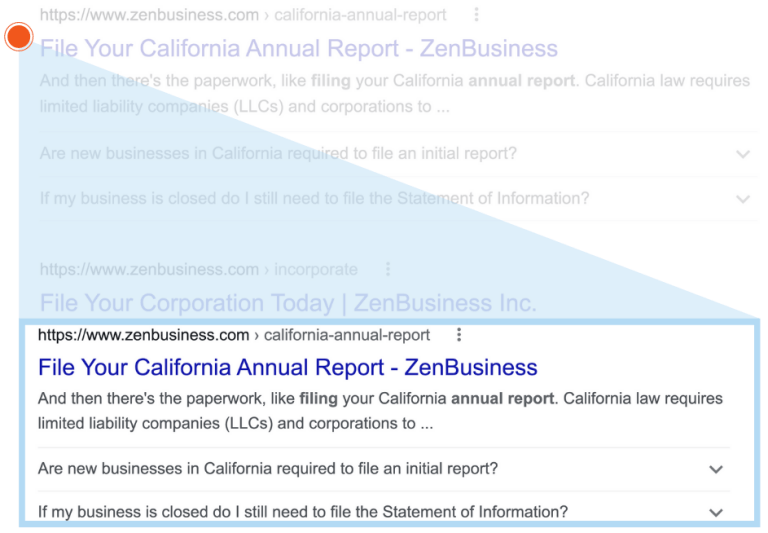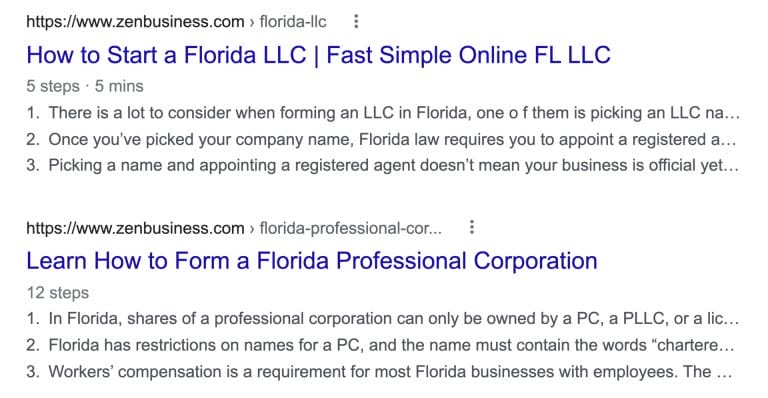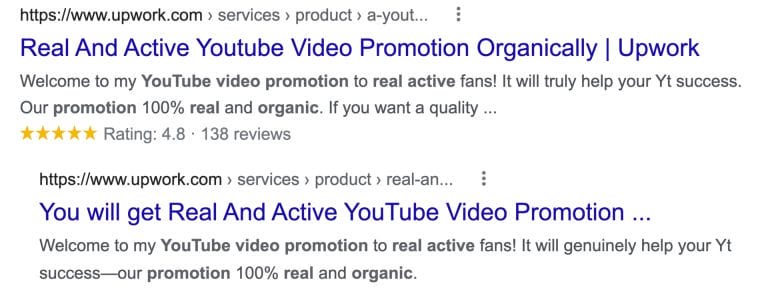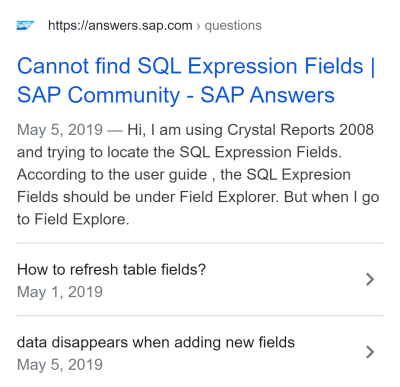Structured Data for B2B Tech
Why Structured Data for B2B Tech Companies?
B2B Tech is competitive. Your technology has been built to solve a specific problem for your customers. We want to help you stand out in SERPs (search engine result pages) as your customers explore solutions to their problems.
The fact is, customers start their research on Google. Good news! Structured data allows you to take control of how your brand, products, solutions, webinars, articles, research, how-tos, videos, case studies…can stand out and capture your customers’ interest, and click!
Beat your competition by owning the most real estate on the first page of Google. We’ll show you how! By the way—we’re also a B2B tech company. We know a little bit about this and we’re excited to share our learning.
Structured data is an advanced SEO strategy that you can see the visual change in the search result AND measure the results. When search engines read structured data, they reward you with a rich result.
New to Guide to Structured Data? Want to see the impact Structured Data can have on your website?
Download our FREE Guide to Structured Data to see how other prominent B2B tech brands grew their clicks and visibility on search engines through Schema Markup.

Trusted by Tech Brands Worldwide





400% net growth in rich result organic traffic

Our work with Schema App has delivered tangible results. In 2019 Schema App optimized more than 4 million pages over 7 websites, resulting in more than 400% net growth in rich results organic traffic. Schema App makes schema markup easy.”
Kathy Visser-May, Vice President, Global Digital Marketing, SAP
STRATEGY
SAP was looking for an authoring solution but also for guidance on strategy, maintenance and success metrics and training for their entire website. SAP partnered with Acronym, who teamed up with Schema App.
AGILITY
During the pilot, Schema App scaled markup to more than 3 million pages in two days with little to no IT effort. In 2019, we optimized more than 4 million pages over 7 websites for SAP.
RESULTS
SAP saw a 400% new growth in rich result organic traffic attributed to the addition to schema markup on their websites. The results were so impressive that SAP won a 2019 Drum Award.
GOOGLE SEARCH
Paid vs Organic Search
Are you debating whether to focus on paid versus organic search to drive more quality traffic to your website? Don’t worry — you aren’t alone!
There are benefits to both pay-per-click (PPC) marketing and search engine optimization (SEO). PPC marketing gives you control over your ad copy with who, when, and where the information in your ads is being shown. What many digital marketers don’t know is that structured data, a technical facet of SEO, gives you a similar type of control: over how your content appears in organic search.
By helping search engines better understand the content on your page through structured data markup, you’re streamlining Google’s ability to match your content to a user’s search intent. You’re controlling how your content appears in organic search results by telling Google who your company is, what you do, and which users would find this information useful.
You’re building trust with Google by providing more information about your brand in a form that search engines can understand — structured data — which can improve your E-A-T. You’re also building trust with users through the control that structured data gives you over how your content appears in search.
SCHEMA MARKUP
Recommended schema markup types
We’ve put together some of our favourite schema markup types that can help your B2B tech brand stand out from the competition in search.
If you need help getting started, we’d love to set up a free consultation for your website!
FREQUENTLY ASKED QUESTIONS
FAQPage Schema Markup for Tech
Frequently asked questions (FAQs) are one of the most popular schema markup types for three key reasons:
- Your content can take up more space in search engine result pages (SERPs).
- You’re delighting your prospects by answering questions right in the SERPs in an engaging and helpful way.
- You’re building trust with search engines by demonstrating your expertise in this particular topic, which can increase your E-A-T.
HOW TO
HowTo Schema Markup for Tech
HowTo is another schema markup type that demonstrates expertise to search engines and customers.
What we love about HowTo is that you’re presenting important information for customers right in the SERPs, while also encouraging users to learn more by visiting your website.
As a tech company, HowTo is a great way to help customers find their own answers in search — resulting in reduced support calls.
PRODUCT
Product Schema Markup for Tech
What’s AWESOME about Product rich results is that users can see price, availability and review ratings right in the SERPs.
Whether you show a price, rating, a price range, or not — there are options for your products to stand out. More advanced is that we can combine this with FAQ!
QUESTIONS & ANSWERS
QAPage Schema Markup for Tech
Similar to FAQPage markup, question and answer (Q&A) markup can answer customer questions right in the SERPs. What’s different is that QAPage is used to pages that contain a question and a way for users to submit answers to that question.
Google recommends that your QAPage schema includes a URL for each individual answer to improve user experience.
SCHEMA MARKUP FOR B2B TECH
Frequently Asked Questions
How do you know if your schema markup is working?
There are several tools you can use to test your schema markup:
- The Schema Markup Validator (SMV) checks the syntax of your schema markup to make sure that it’s been written correctly.
- Google’s Rich Results Test (RRT) shows errors and warnings for your schema markup to ensure that you have included all recommended and required properties for rich result eligibility.
- Schema App’s Editor and Highlighter show errors and warnings for your schema markup as you’re writing it, to ensure that all required and recommended properties for rich result eligibility are included.
- Google Search Console provides comprehensive, customizable reports that reflect how Google understands (and renders) your markup. Measure the impact of your structured data by comparing different time periods and search appearance performance.
- Schema Performance Analytics is Schema App’s scalable, customizable structured data reporting solution. SPA enables your SEO team to track schema markup efforts, to compare trends over different time periods, and to visualize your growth and results from structured data.
How can B2B companies leverage schema markup?
B2B organizations can use schema markup to help search engines better understand their website content. This means that Google can more easily match a user’s search query to products or services like yours. You have the content already on your site — now it’s time to have it stand out and get the organic click with rich results!
By following Google’s structured data guidelines and marking up certain types of content with schema.org types and properties, your brand can take up more real estate on search engine results pages (SERPs) and engage users at different stages of the customer journey.
How does structured data improve your B2B SEO performance?
Schema markup helps search engines contextualize the information on your website, so that Google can better match your content to a user’s search intent. This means more quality website traffic to your site because the user is more likely to find the information that they’re looking for!
Through schema markup, you’re actually defining objects on your webpages as distinct entities with their own properties and relationships to other entities. You’re also connecting your well-defined entities to a search engine’s knowledge graph, which contains entities already defined by trusted sources like Wikipedia and LinkedIn.
Through a customized schema markup strategy, SAP saw a 400% net growth in rich result organic traffic. For Donovan Digital Solutions, they found working with Schema App to be 20x faster than doing the markup manually.
Still not convinced? Check out our ROI of Schema App whitepaper!




